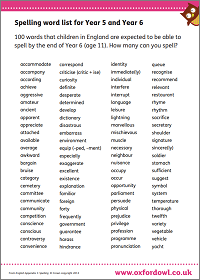Spelling in Year 5 (age 9–10)
In Year 5, your child will be spelling more complicated words with increased accuracy.
Read on to discover the National Curriculum expectations for spelling in Year 5, and to find out how you can support your child at home.
What your child will learn
Take a look at the National Curriculum expectations for spelling in Year 5 (age 9–10):
Using more prefixes and suffixes
Suffixes are morphemes (groups of letters that mean something on their own) that are added at the end of a root or root word to change the meaning. Prefixes are morphemes added at the front of a word.
In Years 5 and 6, your child will learn about lots of prefixes and suffixes to spell longer words and change the meaning of those words.
Spelling some words with ‘silent’ letters
Some words include letters that were sounded hundreds of years ago but aren’t sounded in modern English. For example, in ‘knight’, there used to be a ‘k’ sound before the ‘n’. Now the pronunciation has changed, but the spelling hasn’t, so the word includes a ‘silent’ letter that cannot be predicted from how the word sounds. Words like this can be very tricky to spell.
In Years 5 and 6, your child will learn some of these words, including:
doubt, island, lamb, solemn, thistle, knight
Knowing the difference between homophones and other confusing words
Homophones are words that are spelled differently and have different meanings, but are pronounced in the same (or almost the same) way. They are often confused in children’s writing. In Years 5 and 6, your child will be taught the difference between:
Aisle/isle, aloud/ allowed, affect/effect, altar/alter, ascent/assent, bridal/ bridle, cereal/serial, compliment/complement, descent/ dissent, desert/dessert, draft/draught, farther/further/father, guessed/guest, heard/herd, led/lead, morning/mourning, past/passed, precede/proceed, principal/principle, profit/prophet, stationary/ stationery, steal/steel, wary/weary, who’s/whose
Using morphology and etymology in spelling
Knowledge of roots words can also help when a word isn’t spelled using the most obvious set of letters to represent the sounds. For example, knowing that that science, conscious, and conscience all share the same Latin root can help us to remember tricky ‘sci’ spellings.
Etymology is the study of the origins of words. This includes their history, and how their form and meaning has changed over time. This is useful for spelling words originally from other languages and words that use groups of letters that aren’t the ones we’re expecting.
Checking spellings in a dictionary
Using a thesaurus
How to help at home
There are lots of ways you can help your Year 5 child with spelling. Here are our top ideas.
1. Help with spelling homework
If your child is struggling with a spelling list they have been asked to learn, here are a few ideas to help:
-
- Remind your child to regularly check through their writing for spelling errors. They need to develop a feel for whether a word looks right. They could underline words they are not sure of and then check with a dictionary.
- Use over-pronunciation. So for Wednesday, encourage children to say Wed-nes-day as they write. There are lots of words which feature sounds that aren’t always pronounced clearly (such as words ending in -ed), and over-emphasising these while spelling them out can help fix the spelling in your child’s memory.
- Ask your child to write down the words that they need to remember how to spell. The physical act of writing the words by hand helps to anchor the spelling in children’s memories and encourages them to think about the letters that represent the sounds in the word. Typing the words into a PC or tablet isn’t as effective.
- Focus your child’s attention on the tricky bits in a word by asking them to highlight them. For example, show them that said has ‘ai’ in the middle and ask them to write the word, and then highlight or underline this part to help them remember. Few resources are more motivating than a highlighter pen for primary-aged children!
2. Play spelling games
Playing games can help children to learn about spelling in an enjoyable way. Watch grammar expert Charlotte Raby’s video ‘How can I help my child with grammar, punctuation and spelling?’ to see some fun and easy games:
Charlotte Raby offers her expert advice for helping your child develop their grammar, punctuation, and spelling skills at home.
For example, your child may have to learn ‘room took hoop foot book’. They could make up a silly sentence such as ‘The boy took his book across the room but got his foot caught in a hoop’. Why not draw illustrations to go with the sentences?
3. Find the right resources
Learning to spell is a gradual process and mastering English’s complex spelling system can take time. All children are different: some pick up spelling quickly, while others take longer. Whatever their level, we have lots of free spelling activities to support them.
Year 5 & 6 spelling word list

100 words children are expected to be able to spell by the end of Year 6.
